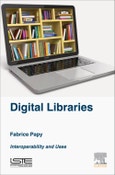The technological interoperability of digital libraries must be rethought in order to adapt to new uses and networks. Informative digital environments aimed at responding to heritage, cultural, scientific or commercial demands have taken over the global cyberspace and have redesigned the techno-informative landscape of the Web. However, while the technological models demonstrate their effectiveness and explain to a large extent the creation of digital libraries, archives and deposits, the subjacent concept of uses continues to cause debate.
The information technologies used by heterogeneous digital libraries enable a technical interoperability of content. This is not enough to allow the adhesion of a public connected to very different information profiles and techniques. This book explores the avenues of a user-orientated interoperability where the questions of consultation interfaces and content description processes are studied.
Please Note: This is an On Demand product, delivery may take up to 11 working days after payment has been received.
Table of Contents
1. Information Retrieval, Web and Interoperability 2. Interoperability, Interface and Hypertext 3. Usage-Oriented Interoperability Instruments 4. Usage Prospects








